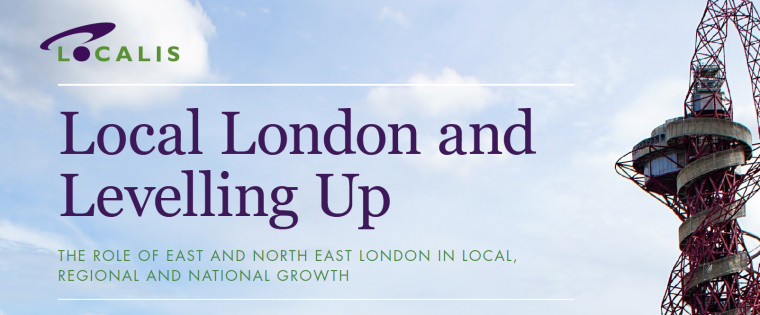Go East and give London subregion growth to level up and deliver full potential, Localis report urges

Government must masterplan investment in the East of London to fulfil the immense economic, human and social potential of a vast subregion – which otherwise has more in common with ‘left behind’ parts of the country than the rest of the capital – the think-tank Localis has argued.
In a report published today entitled ‘Local London and Levelling Up – the role of East and North East London in local, regional and national growth’, Localis makes the case for enhancing physical and digital connectivity to encourage professional industries to locate and take advantage of the fact London’s geography is moving eastwards.
According to Localis, the boroughs of north and east London, which comprise the Local London subregion, have some of the highest levels of the most deprived neighbourhoods in the country and enjoy lower economic productivity (GVA) per head than anywhere else in the capital let alone the Greater Manchester, Liverpool City Region or West Midlands combined authorities.
Instead, the think tank argued, in a report commissioned by Local London, that the subregion has more in common with ‘left behind’ areas such as Cornwall, Teesside and West Wales, and as such should be eligible for the same money from the UK Shared Prosperity Fund as was earmarked under previous EU funding support.
Among its key recommendations, Localis calls for a subregional growth deal that would give the Local London subregion’s leaders the power to ‘masterplan’ – alongside government and the Greater London Authority – an ambitious vision for the area, and dedicated funding to convene and coordinate constituent boroughs and external partners to ‘level up’ an area home to 2.3 million people.
Other report recommendations include calls to:
- Unlock human potential: in terms of skill levels, Local London lags the rest of the capital, which limits the opportunities of residents and reduces the desirability of the subregion as a location for business.
- Develop investment opportunities: including prospects for regeneration and development on brownfield sites and associated infrastructure improvements, as well as a need to double down on existing infrastructure projects in the Thames Estuary and the Innovation corridor.
- Encourage government to build back better and level up East London by working with the subregion and key partners like GLA, Thames Estuary Growth Board and Innovation Corridor to create and deliver a new masterplan for East London with proper investment to catalyse private investment.
Localis head of research, Joe Fyans, said: “London’s geography is moving Eastwards – with multiple major developments with varying levels of national significance detailed in this report – and it is important that growth is managed, inclusive of residents and maximises national benefits.
“To ensure that the provision of skills, employment and housing are co-ordinated and serve the overarching national, regional and local goals for recovery and renewal, as well as being connected with the bordering areas to London and associated projects, a formalised subregional convening role is required.
“Local London needs a subregional deal for growth, giving the subregional leadership board power to convene and coordinate constituent boroughs and external partners in delivering levelling up. A multi-year ‘masterplan’, encompassing the different borough’s local and corporate plans into an overall vision for the area must be agreed and funded between the boroughs, the government and the Greater London Authority.”
Cllr Darren Rodwell, Chairman of Local London and Leader of Barking & Dagenham Council, said: “Local London has long feared the Government’s levelling-up agenda would mean levelling-down London. Any loss of funding or opportunity in this part of London would be disastrous. We hope the Government’s White Paper will provide us with some reassurance this isn’t the case.
“It’s a fact that East London was classified as a ‘less developed’ region by the EU – alongside others more traditionally regarded as deprived and left-behind in the north and west – and earmarked for more than £1 billion in cohesion funding between 2021-7 to help us catch up. That’s now lost.
“As this report shows, our situation has been made even worse by the pandemic, and we risk falling even further behind without bold and imaginative thinking as well as funding. We need a long-term deal for growth and the ability to determine our own future, and we call on the Secretary of State to enable that.”
